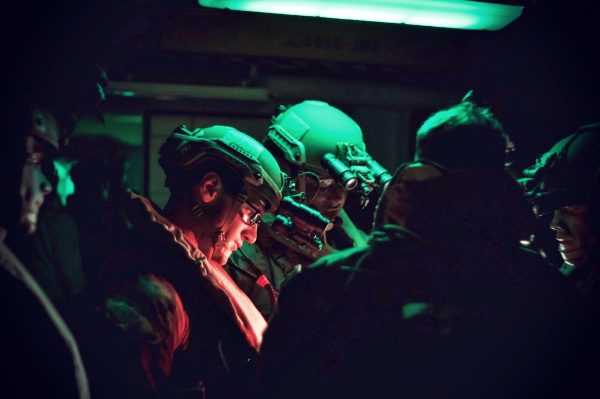Aggravated Sexual Assault MCM 45b(3) – Article 120 UCMJ
Aggravated Sexual Assault is causing another person to engage in a “sexual act”:
- by using threats of or creating fear of bodily harm or other harm less than death, grievous bodily harm or kidnapping
- or by causing bodily harm
- or the other person is substantially incapacitated or unable to appraise the act, decline it or communicate unwillingness
The definition of sexual act is the same as defined under rape.
“Threatening” bodily harm “less than death, grievous bodily harm or kidnapping” includes such non-physical threats as to accuse another of a crime; to publish a secret exposure of which could subject the victim to ridicule, hatred or contempt; or abuse military rank to affect another’s career. MCM 45a(t)(7)
“Bodily harm” means offensive touching of another, however slight, and includes touching someone other than the victim if that contributes to the victim’s submission to the act. MJ Benchbook 34-5-d
Attorney Aggravated – Article 120
Court-martial Defense Counsel
Our fierce court-martial attorneys at Gonzalez & Waddington will arrange free counseling to discuss your allegations in detail and explain how they will fight your case, which is different from most military attorneys. Use the contact form contact our determined military defense lawyers at Gonzalez & Waddington for legal advice. Call to speak to our fierce defense lawyers at Gonzalez & Waddington.
Click here for: Closing Arguments Examples
Fierce Court-martial Counsel
The sexual assault defense lawyers at Gonzalez-Waddington have extensive experience handling all types of criminal charges, ranging from Sexual offenses, Aggravated Assault – Article 128, UCMJ, Forcible Pandering, Desertion – Article 85, UCMJ, or Leaving Scene of Vehicle Accident – Article 111, UCMJ. Our experienced military criminal defense attorneys use their his knowledge to put together a powerful aggressive defense against felony allegations in federal, military, and state courts.
Human Trafficking And The Sex Trade
The Trafficking Victims Protection Reauthorization Act defines sex trafficking as the recruitment, harboring, transportation, provision, or obtaining of a person through violence, fraud, or coercion to induce someone to engage in a commercial sexual act. Trafficking in human beings for sexual or other work involves transporting victims across international borders, which is the definition of trafficking in human beings, which requires the exploitation of human beings because they are coerced or deceived, but not transporting them across national borders.
People are trafficked and exploited in many forms, including forced sexual exploitation, labor, begging, crime (such as cannabis cultivation or drug trafficking), domestic servitude, marriage, and organ harvesting. Victims of trafficking can be of any race, color, national origin, disability, religion, age, gender, sexual orientation, gender identity, socio-economic status, education, and citizenship status. The vast majority of victims of sex trafficking are women and girls, but men and boys, as well as trans, inter-and non-binary persons, can also be victims.
The number of US citizens who fall victim to human trafficking outside the United States each year is high, with estimated 200,000 American children at risk of being turned into the sex industry. The US State Department publishes an annual report on human trafficking with breakdowns for each country but focuses on government action to address the problem and does not estimate the total number of victims. The Global Report on the Trafficking in Persons 2020 shows that 50% of the detected victims were forced into sexual exploitation in 2018, 38% into forced labor, 6% into criminal acts, 1% were forced to beg, and a small number were forced into marriage, organ harvesting or other purposes in 2018.
Trafficking in human beings, also known as human trafficking or modern slavery, is a crime in which persons are forced or forced to perform labor services or engage in commercial sexual acts. Trafficking in human beings is defined in the UN Protocol on Trafficking in Human Beings. This protocol complements the Convention on the United Nations Convention against Transnational Organised Crime. It defines Trafficking in Human Beings as “the recruitment, transport, transfer, accommodation or reception of persons through threats, violence or other forms of coercion, kidnapping, fraud or deception to the purpose of exploitation. It is the recruitment, reception, promotion, provision, or procurement of a person for forced labor or a commercial sexual act by force, deception, or coercion.
Sex trafficking is the recruitment, promotion, transfer, accommodation, or reception of persons through threats of violence, coercion, fraud, deception, or abuse of power for financial gain. Exploiting minors for commercial sex or trafficking in human beings is a form of violence or fraud in which coercion is used.
In the United States, minors under the age of 18 who engage in commercial sexual activity are considered to be victims of sex trafficking. The Law on the Protection of Victims of Trafficking in Human Beings, adopted in 2000, defines victims of trafficking as adults involved in a commercial sexual act caused by violence, fraud, or coercion and as persons who have been induced to do so but have not yet reached the age of 18. Therefore, in the US, a child who does not need to be forced into sexual exploitation under the Victims of Trafficking and Violence Protection Act of 2000 is considered a victim of sexual trafficking.
Advocates of human trafficking no longer refer to victims as juvenile prostitutes, victims of commercial sexual exploitation, or victims of human trafficking. The arrests come amid a push for state-wide “safe harbor” laws passed in 34 states to prevent victims of child trafficking from being prosecuted for prostitution and other charges related to commercial sex.
The Victims of Trafficking and Violence Protection Act of 2000 (TVPA) and its re-authorization in 2003 (TVPRA) provide comprehensive protection and services to victims of human trafficking found by governments of any nationality in the United States.
According to the UN, in trafficking, the victim’s consent to exploitation is irrelevant if threats, violence, deception, coercion, abuse of power, or positions of vulnerability are used.
Victims of sex trafficking can perform other functions besides forced employment as sex workers. The exact number of sex trafficking victims forced to work in illegal massage parlors is unknown.
According to the National Centre for Missing and Exploited Children, one in seven of the more than 23,500 runaways reported to the agency are likely to be victims of child trafficking. Many victims of sex trafficking in the United States are trafficked outside the United States. Still, American youth are also trafficked, often because of stories of abuse or fleeing from home.
In August 2016, Amnesty International maintained and reiterated its strong condemnation of trafficking in human beings and published an exemplary policy calling on all countries to decriminalize sex trafficking to protect the health and human rights of sex workers.
This policy is supported by :
- the World Health Organization (WHO)
- UNAIDS Global Alliance Against Trafficking in Women (GAATW)
- Human Rights Watch
- Lambda Legal
- the American Civil Liberties Union
- Freedom Network the US
- Numerous other organizations that focus on vulnerable populations, including victims of human trafficking.
Studies on sex work and measures against sex trafficking aimed at combating and supporting victims of sex trafficking raised concerns about the unintended effects of specific national and international strategies, law enforcement strategies, and activist efforts on persons involved in sex trafficking and sex workers not engaged in human trafficking.
Many civil society organizations that boycotted the Human Trafficking Summit criticized the US government. Including inspecting the immigration status of T-Visa applicants and allowing sure victims of human trafficking to stay and work in the United States if they cooperated with law enforcement or agreed to cooperate with the investigation.
The most frequently cited red flags by bank employees were:
- customers accompanied by someone who seems in control of the customer
- individuals who have multiple accounts in their name
- heavy use of cash
- numerous simultaneous charges
- sex traffickers prefer sex traffickers ride-sharing services to taxis
- sex traffickers who track their victims “travels in real-time using apps
- and several concurrent hotel rooms fees.
Frequently Asked Questions
1- What is Aggravated Sexual Assault under MCM 45b(3) – Article 120 UCMJ?
Aggravated Sexual Assault under MCM 45b(3) refers to a specific offense within the Uniform Code of Military Justice (UCMJ) that involves engaging in a sexual act with another person under certain aggravated circumstances, such as when the victim is incapacitated, physically helpless, or coerced by threat or force.
2- What constitutes a “sexual act” under this article?
A “sexual act” under Article 120 includes penetration, however slight, of the genital or anal opening by any part of the body or an object, or contact between the mouth and genitalia.
3- What are the “aggravating circumstances” mentioned in this article?
Aggravating circumstances include situations where the victim is:
- Substantially incapacitated.
- Physically helpless.
- Subjected to force or the threat of force.
- Subjected to a threat that places the victim in fear of death, bodily harm, or kidnapping.
4- How does the military define “substantially incapacitated”?
“Substantially incapacitated” refers to a condition where the victim is unable to understand the nature of the sexual act or physically unable to decline participation or communicate unwillingness to engage in the sexual act due to mental or physical impairment, intoxication, or unconsciousness.
5- What are the potential consequences of a conviction under Article 120?
A conviction under Article 120 for Aggravated Sexual Assault can result in severe penalties, including:
- Dishonorable discharge.
- Imprisonment.
- Reduction in rank.
- Forfeiture of pay and allowances.
- A criminal record that can impact civilian life.
6- Can consent be used as a defense in these cases?
Consent cannot be used as a defense if the victim is found to be incapacitated, physically helpless, or coerced. In other situations, the existence of consent must be evaluated based on the circumstances and evidence presented.
7- How are allegations of Aggravated Sexual Assault investigated in the military?
Allegations are investigated by military law enforcement, such as the Criminal Investigation Division (CID) or the Naval Criminal Investigative Service (NCIS). Investigations include gathering physical evidence, interviewing witnesses, and obtaining statements from the involved parties.
8- What should a service member do if they are accused of Aggravated Sexual Assault?
If accused, a service member should:
- Immediately seek legal counsel, preferably from a military defense attorney.
- Avoid discussing the case with anyone other than their attorney.
- Cooperate with the investigation while following their attorney’s advice.
9- How can victims of Aggravated Sexual Assault get support within the military?
Victims can access support through various resources, including:
- Sexual Assault Response Coordinators (SARCs).
- Victim advocates.
- Medical and mental health services.
- Legal assistance.
10- Are there preventive measures in place within the military to address sexual assault?
Yes, the military has several preventive measures, including:
- Training and education programs on sexual assault awareness.
- Policies and procedures to create a safer environment.
- Reporting systems that encourage reporting and provide support for victims.



